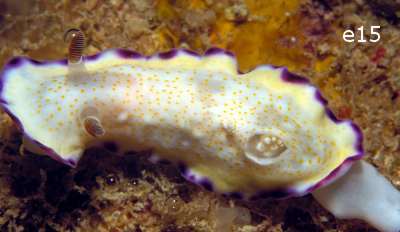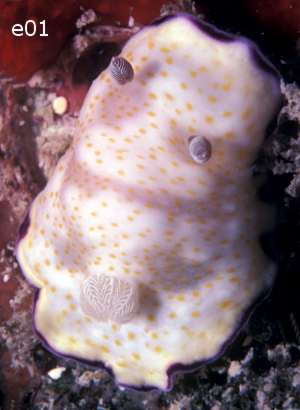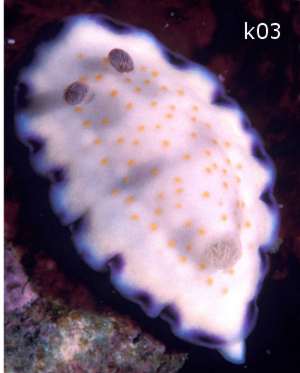Chromodoris rufomaculata from the Marshall Islands
March 7, 2005
From: Scott Johnson

Hi Bill,
Attached are three typical Chromodoris rufomaculata from the Marshall Islands. At Enewetak and Kwajalein they live underneath dead coral rocks at depths of about 2 to 10 meters typically. Both of the similar species C. albopustulosa and C. alius are in the same areas, and they don't always seem too particular about whom they pair up with. I've seen C. rufomaculata and C. albopustulata mate in a captive situation. C. rufomaculata is the most common of the three at Enewetak.
Locality: Enewetak and Kwajalein Atolls. Marshall Islands, Pacific. Depth: 5 m. Length: 30 mm (e01), 35 mm (e15), 10 mm (k03). Under dead coral on subtidal reefs. Photographer: Scott Johnson
Scott
uwkwaj@yahoo.com


Dear Scott,
Thanks for this. After looking at your photos in this, and the accompanying messages, I am pretty convinced that C. rufomaculata and C. albopustulata are forms of the same species. Your record of them cross-mating is, at least in my mind, fairly irrefutable evidence. It looks as though 'C. rufomaculata' is a form in which the white pigmentation on the mantle predominates, while in the 'C. albopustulata' form the white pigmentation is restricted to white spots scattered over the mantle. As I discuss in a separate message[#13260 ] it would seem that C. rufomaculata, C. albopustulata, C. alius and C. aureopunctata are all colour forms of the same species
Best wishes,
Bill Rudman
Related messages
-
Chromodoris rufomaculata from sthn Queensland
From: Gary Cobb, September 4, 2009 -
Original illustration of Chromodoris rufomaculata Pease 1871
From: Bill Rudman, March 7, 2005 -
Chromodoris rufomaculata?
From: Erwin Koehler, June 18, 2000
